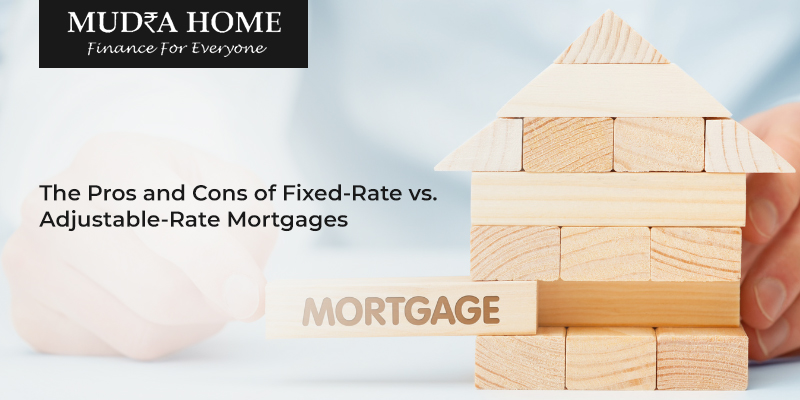
When it comes to choosing a mortgage, one of the crucial decisions you’ll need to make is whether to opt for a fixed-rate or adjustable-rate mortgage. Both options have their advantages and disadvantages, and understanding them can help you make an informed decision. In this article, we’ll explore the pros and cons of fixed-rate and adjustable-rate mortgages to assist you in selecting the best option for your financial needs.
A fixed-rate mortgage is a loan with an interest rate that remains constant throughout the entire loan term. Here are the key advantages and disadvantages of opting for a fixed-rate mortgage:
Pros
Stability: One of the significant advantages of a fixed-rate mortgage is the stability it provides. Your monthly mortgage payments will remain the same over the life of the loan, making it easier to plan and budget your finances.
Predictability: With a fixed interest rate, you know exactly how much interest you’ll be paying over the term of your mortgage. This predictability allows for better financial planning and ensures that your payments won’t fluctuate with market conditions.
Long-Term Savings: Fixed-rate mortgages are an excellent choice if you believe interest rates will rise in the future. By locking in a low rate now, you can potentially save money over the long run.
Cons
Higher Initial Rates: Compared to adjustable-rate mortgages, fixed-rate mortgages often come with higher initial interest rates. This means that initially, you may pay more each month compared to someone with an adjustable-rate mortgage.
Limited Flexibility: While stability is an advantage, it can also be a downside. With a fixed-rate mortgage, you won’t benefit from falling interest rates unless you refinance. This lack of flexibility might not be ideal if you anticipate a significant drop in interest rates.
Adjustable-Rate Mortgages: Flexibility and Potential Savings
An adjustable-rate mortgage, also known as an ARM, is a loan with an interest rate that can fluctuate over time based on market conditions. Let’s explore the advantages and disadvantages of choosing an adjustable-rate mortgage:
Pros
Lower Initial Rates: Adjustable-rate mortgages often come with lower initial interest rates compared to fixed-rate mortgages. This lower rate can result in lower monthly payments, allowing you to save money during the initial years of your mortgage.
Potential Savings: If interest rates decrease in the future, an adjustable-rate mortgage offers the advantage of lower monthly payments without the need for refinancing. This flexibility allows you to take advantage of falling interest rates and potentially save money.
Shorter-Term Options: Adjustable-rate mortgages typically offer shorter initial fixed-rate periods, such as 5, 7, or 10 years. If you plan to sell or refinance before the fixed-rate period ends, an ARM can provide you with the flexibility you need without the commitment of a long-term loan.
Cons
Uncertainty: The main disadvantage of adjustable-rate mortgages is the uncertainty surrounding future interest rate adjustments. Your monthly payments can increase if interest rates rise, making it challenging to budget and plan for the future.
Risk of Higher Payments: While adjustable-rate mortgages initially offer lower rates, there is a risk that rates will rise in the future. If this happens, your monthly mortgage payments could increase, potentially putting a strain on your finances.
Choosing between a fixed-rate and an adjustable-rate mortgage depends on your financial goals, risk tolerance, and market conditions. If stability, predictability, and long-term savings are important to you, a fixed-rate mortgage might be the right choice. On the other hand, if you value flexibility, lower initial rates, and the potential for short-term savings, an adjustable-rate mortgage could be a suitable option. Remember to carefully consider your financial situation and consult with a mortgage professional to make an informed decision that aligns with your specific needs.